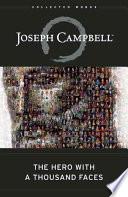Quotes from book
The Hero with a Thousand Faces

The Hero with a Thousand Faces is a work of comparative mythology by Joseph Campbell, in which the author discusses his theory of the mythological structure of the journey of the archetypal hero found in world myths.

Source: The Hero with a Thousand Faces (1949), Chapter 1
Context: Dream is personalized myth, myth is depersonalized dream; both myth and dream are symbolic in the same general way of the dynamics of the psyche. But in the dream the forms are quirked by the peculiar troubles of the dreamer, whereas in myth the problem and solutions shown are directly valid for all mankind.

“The passage of the mythological hero”
Source: The Hero with a Thousand Faces (1949), Chapter 2
Context: The passage of the mythological hero may be overground, incidentally; fundamentally it is inward—into depths where obscure resistances are overcome, and long lost, forgotten powers are revivified, to be made available for the transfiguration of the world.... Something of the light that blazes invisible within the abysses of its normally opaque materiality breaks forth, with an increasing uproar. The dreadful mutilations are then seen as shadows, only, of an immanent, imperishable eternity; time yields to glory; and the world sings with the prodigious, angelic, but perhaps finally monotonous, siren music of the spheres. Like happy families, the myths and the worlds redeemed are all alike.

“Instead of clearing his own heart the zealot tries to clear the world.”
Source: The Hero with a Thousand Faces

Source: The Hero with a Thousand Faces (1949), Chapter 2, page 87 (New World Library, 2008)
Context: (...) we today (in so far as we are unbelievers, or, if believers, in so far as our inherited beliefs fail to represent the real problems of contemporary life) must face alone, or, at best, with only tentative, impromptu, an not often very effective guidance. This is our problem as modern 'enlightened' individuals, for whom all gods and devils have been rationalized out of existence.

“Dream is personalized myth, myth is depersonalized dream; both myth and dream are symbolic”
Source: The Hero with a Thousand Faces (1949), Chapter 1
Context: Dream is personalized myth, myth is depersonalized dream; both myth and dream are symbolic in the same general way of the dynamics of the psyche. But in the dream the forms are quirked by the peculiar troubles of the dreamer, whereas in myth the problem and solutions shown are directly valid for all mankind.

Epilogue
The Hero with a Thousand Faces (1949)
Context: Wherever the hero may wander, whatever he may do, he is ever in the presence of his own essence — for he has the perfected eye to see. There is no separateness. Thus, just as the way of social participation may lead in the end to a realization of the All in the individual, so that of exile brings the hero to the Self in all.